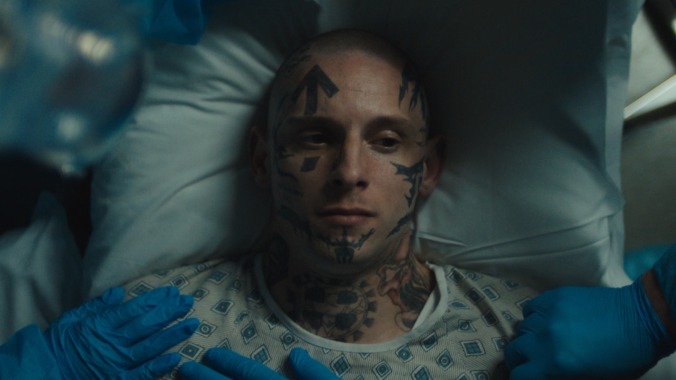“What if I take all of this stuff off and I’m still a piece of shit?” wonders Bryon “Babs” Widner (Jamie Bell) toward the end of Skin, Guy Nattiv’s “inspired by true events” drama about a reformed skinhead’s journey out of the white power movement. The “stuff” refers to Bryon’s tattoos, neo-Nazi ink that covers his body from feet to forehead, betraying the years he spent with the Vinlanders, a violent group of mosque-burners based in Ohio. The irony that he should now be judged for his appearance is not lost on the viewer, though it seems to be just beyond the grasp of the film, and the climactic moment of doubt feels unearned. After all, Nattiv (also responsible for the execrable Oscar-winning short film of the same title) has spent most of Skin’s running time telling us, in one form or another, that it’s what’s on the outside that counts.
We first get to know Bryon as the favorite adopted son of the leaders of the Vinlanders, “Hammer” Krager (Bill Camp) and his wife, “Mom” (a menacing Vera Farmiga), but the truth is that the seeds of doubt have already been sown; we can see it in the way he watches Hammer prey on a homeless teen named Gavin (Russell Posner), inviting him back to the Vinlanders’ backwoods compound with the promise of beer. The Kragers talk big about Nordic heritage and old-time Odinist religion, but their operations seem to have more in common with Pinocchio’s Pleasure Island, promising wayward boys and young men all the booze, violence, loud music, and brotherhood they could ever want. And before you know it, you’re looking at yourself in the mirror with a cross of Wotan tattooed over your Adam’s apple and “Vinlanders” printed on your cheek.
One can already see the underlying problem with Skin’s dramatic arc: We never really buy Bryon as a racist, only as a troubled man who just needs a push in the right direction. That push comes in the form of Julie (Danielle Macdonald), a single mom who is already on her way out of the movement. They meet at a Vinlanders barbeque where her three daughters have been asked to perform. The two strike up an unlikely romance; he helps her cover up a swastika tattoo on her thigh, and later, they move in together, drifting further and further out of the grasp of the Kragers, who seem to have their sights set on Jeanie’s sullen teenage daughter. Occasionally, Nattiv cuts to flash forwards that show Bryon undergoing painful procedures to have his tattoos removed. These sequences hold an obvious visual interest for Nattiv; he lavishes them in slow-motion macro close-ups set, without a note of irony, to Beethoven and Vivaldi. But he can’t figure out how to use them dramatically, except as punctuation.
That the characters of Skin never feel more than two-dimensional isn’t the fault of the actors. Bell and especially Macdonald give fine performances, shading in their characters’ human qualities and imperfections when they aren’t getting lost in the shallow-focus close-ups that are Nattiv’s preferred method for directing any given dialogue scene. (Macdonald also appeared in “Skin” the short, which, despite overlapping subject matter, is unrelated to this film.) Depicting an internal conflict can be difficult, but Skin feels especially superficial, even with the help of external commentary from Gavin, whose absorption into the Vinlanders presumably parallels Bryon’s own early years with the group, and Daryle Jenkins (Mike Colter), the black activist who periodically hounds Bryon and Julie. Jenkins seems to have played a big role in the real Bryon Widner’s life story (previously profiled in a 2011 MSNBC special called Erased Hate), but in Skin, he comes across as an extraneous character.
That’s without mentioning the shoot-outs and mortal danger that the movie throws into the latter part of the film in an apparent attempt to externalize emotional stakes that were never really there; Bryon’s witnessing of a brutal triple murder committed by the Vinlanders seems offhand compared to the way Nattiv treats the killing of the protagonist’s beloved Rottweiler. Even in the context of artistic license, it’s distasteful. But then, this kind of hamfisted manipulation seems par for the course in a movie that’s eager to lob as much as it can as its central problems. The theme of change is purely cosmetic: The characters are intractable, and they all offer different versions of the same pathology.
Bryon? He got into the movement because his parents were alcoholics and he needed a place to belong. Gavin? He just needed a place to sleep and something to eat. The Kragers? Their child was stillborn, so they turned to adopting “vikings.” Julie? Klansman dad, abusive ex. But the question of how millions of people manage to live through abusive childhoods, abusive relationships, and other traumas without picking up Tiki torches and chanting “Blood and soil!” is one that Skin never ponders.


